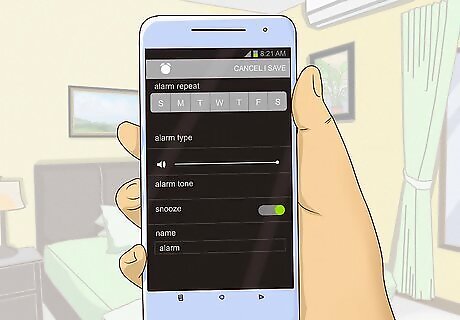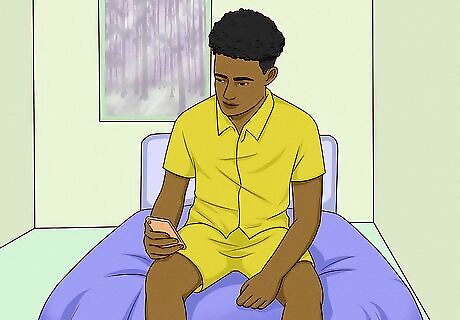
views
X
Trustworthy Source
PubMed Central
Journal archive from the U.S. National Institutes of Health
Go to source
These tips can help you to wake up quickly and feeling ready to face the day.
Waking Up Quickly

Let natural light in. Our brains respond to natural light by sending signals to the nervous system to raise body temperature, produce the hormone cortisol and reduce the amount of sleep-inducing melatonin in the bloodstream, all of which are vital to feeling awake. Make sure you don't have heavy blinds or curtains blocking natural light from your bedroom. Open the curtains and let the light in as soon as you wake up. During the winter months, when the sun rises later, consider getting an alarm clock that uses light to stimulate those important bodily processes.

Make it hard to ignore your alarm. There are various ways you can do this. Set the alarm clock to the loudest setting. Loud noise, while unpleasant, stimulates adrenaline production, making you feel temporarily more alert. Place your alarm far away so that you physically have to get out of bed to turn it off. Even better, hide your alarm somewhere in your bedroom so that you have to get out of bed and find it before you can turn it off.

Don’t hit snooze. Though it can be tempting to keep hitting that snooze button, don't. Remind yourself that it is a counter-productive habit and that the sleep you get after hitting snooze is not good quality. Consider these points: When we use the snooze button and drift off for a short period, our bodies are re-entering a new phase of the sleep cycle. The normal snooze length is around 10 minutes and this is insufficient to reach the deepest phase of REM sleep, which is the kind of sleep that makes you feel rested. Each time you hit that snooze button it gets harder to wake up.

Use technology as an aid. There are a lot of devices and apps that you can use to help yourself wake up, like sleep cycle alarm clocks and apps that track your REM sleep. Use an app that tracks your sleep cycle. Many of these apps come with inbuilt alarms that wake you in the lightest phase of sleep. The sleep cycle typically lasts 90 minutes and if we are woken up in the deepest phase of REM sleep, we are more likely to feel groggy and find it difficult to get out of bed. Download an alarm app that makes you solve a math problem or complete a task before the alarm shuts off. This requires concentration and focus, after you've spent the time completing the task you'll find you feel wide awake. Download or buy an alarm that requires you to vigorously shake it before it turns off. Keep in mind that light from electronics like cell phones, tablets, and computers may interfere with your sleep. Shut off these devices about one to two hours before you go to bed.
Staying Awake

Get moving. Don’t be tempted to settle back down under the covers when your alarm goes off. As soon as you wake up, swing your feet onto the floor and get out of bed. Here's what you can do to get moving. Get the blood flowing. Exercising stimulates the production of endorphins, which reduce stress and anxiety, and improves blood circulation, making you feel more awake. Try high-intensity full body exercises like jumping jacks, push-ups or squats, which can be done in your bedroom as soon as you wake up. Experts also suggest getting outdoors and taking a morning walk or a morning run to wake up.

Breathe deeply. Concentrating on taking a few deep breaths when you wake can improve focus and make you feel energized. Try some diaphragmatic breathing exercises or yogic breathing exercises, both can boost blood oxygen and energy.

Drink water. After sleeping all night the body is often dehydrated, so you may feel tired and low on energy. As soon as you wake, drink a glass of water. Some experts believe that drinking water first thing kick-starts the body’s metabolism and can even help you lose weight.

Eat a healthy breakfast. The most important meal of the day, eating a healthy and nutritious breakfast in the morning can combat tiredness and improve your energy levels throughout the morning. Pick something with protein and fiber. Experts suggest a breakfast with a good combination of fiber and protein to boost your energy. For example, nuts are a particularly good breakfast item because they contain both fiber and protein. Avoid too much sugar. A sugary breakfast may give you immediate results, helping you feel awake, but it causes your blood sugar to spike rapidly and will ultimately leave you feeling more tired for the rest of the day. Complex carbohydrates. Although carbohydrates supply our bodies with much-needed energy, simple carbohydrates found in many breakfast foods such as donuts and pastries are quickly used up by the body and can leave us feeling fatigued. Opt for complex carbohydrates (found in whole grains and fruits) instead, as these release energy slowly, preventing that mid-morning slump. A breakfast of complex carbohydrates combined with protein will also make you feel fuller for longer.

Stimulate the senses. Use your senses of smell and touch to feel revitalized and energetic in the mornings. Smell the coffee. Scientists have found that just the aroma of coffee can reduce the effects of sleep deprivation. Essential oils. It’s not just the smell of coffee that can wake us up, research suggests that essential oils like peppermint, eucalyptus and rosemary can also improve subjective feelings of alertness. Take a cold shower. Taking a cold shower improves circulation and can make you feel wide awake.
Prepping the Night Before

Go to bed earlier. It sounds obvious, but after a full night's sleep you are much less likely to find it hard to wake up in the morning. Aim for 8 hours sleep per night. Prioritize getting good rest the night before.

Cut down on coffee and alcohol. Caffeine is known to affect both quality and quantity of sleep. Likewise alcohol, while sometimes used as a sleep aid, also has a negative impact on sleep quality as you experience less REM sleep even though it may be initially easier to fall asleep. Lower your consumption of both caffeine and alcohol to improve the overall quality of your sleep, which will in turn make it easier to get up and go the morning. Be careful to avoid caffeinated beverages about six hours prior to your bedtime. Drinking caffeine too close to bedtime may interfere with your sleep, while avoiding caffeine in the six hours before your bedtime may make it easier for you to fall and stay asleep.

Get organized. Spend some time the night before on organizational tasks in order to minimize the number of decisions you have to make in the morning. This will stop you from feeling overwhelmed and allow you to focus on waking up and feeling alert. Some things you can do include: Prepare your breakfast the night before. Pack your bag for work or school in the evening so that you are ready to pick up and go in the morning. Select your outfit the night before and leave it out somewhere easily accessible.

Give yourself time. If you consistently find it difficult to wake up, rather than focus on short-term fixes it may simply be better to recognize this and adjust your routine accordingly. Try to give yourself enough time in the morning to wake up properly. This might entail setting your alarm a few hours early before an important meeting or event so that you can wake up fully without stress and anxiety.




















Comments
0 comment